As a proud rabbit owner, I know how important it is to provide my furry friend with a healthy and balanced diet. While rabbits are herbivorous animals, it’s crucial to understand what fruits they can safely eat. In this article, I’ll share with you a comprehensive list of rabbit-friendly fruits and provide helpful tips on how to integrate them into your bunny’s diet.
Key Takeaways:
- Rabbits can safely eat a variety of fruits, but it should only make up a small portion of their diet.
- Grass hay, leafy green vegetables, and rabbit pellets should be the main components of a rabbit’s diet.
- Introduce new fruits slowly and monitor your rabbit’s response to ensure they tolerate them well.
- Some safe fruits for rabbits include apples, bananas, strawberries, watermelon, and papaya.
- Offer fruits as occasional treats, and limit their intake to about 10% of your rabbit’s overall diet.
The Importance of a Balanced Rabbit Diet
When it comes to feeding rabbits, a balanced diet is essential for their overall health and well-being. While fruits are a delicious treat for your furry friend, they should only make up a small portion of their diet. The majority of their food intake should consist of grass hay and leafy green vegetables, with fruits being offered as occasional treats.
Grass hay is a vital component of a rabbit’s diet as it provides essential nutrients, promotes healthy digestion, and helps maintain their dental health. Fresh greens, such as parsley, spinach, mustard greens, and beet greens, should also be included in their diet, making up about 75% of the fresh portion. These leafy greens are rich in vitamins and minerals that contribute to your rabbit’s overall well-being.
While fruits can be a tasty addition to your rabbit’s diet, they should be limited to about 10% of their overall intake. It’s important to offer a variety of fruits to ensure they receive a well-rounded diet and prevent boredom. Some recommended fruits for rabbits include apples, apricots, blueberries, strawberries, and watermelon. Remember to introduce new fruits slowly and monitor your rabbit’s response to ensure they tolerate them well.
The Benefits of a Balanced Diet
A balanced diet not only provides your rabbit with the necessary nutrients for their overall health but also helps prevent digestive issues and obesity. By offering a variety of grass hay, leafy greens, and small amounts of fruits, you can ensure that your furry friend receives a well-balanced and nutritious diet.
| Fruit | Benefits |
|---|---|
| Apples | Rich in vitamins A and C, and a great source of fiber. |
| Apricots | High in vitamin A, potassium, and fiber. |
| Blueberries | Packed with antioxidants and high in vitamin C. |
| Strawberries | Rich in antioxidants and high in vitamin C. |
| Watermelon | Hydrating fruit with high water content and a good source of vitamins A and C. |
Remember to always consult with a veterinarian to ensure you are providing the best diet for your individual rabbit’s needs. By offering a well-balanced diet and incorporating a variety of fruits and vegetables, you can provide your furry friend with the nutrients they need to thrive.
Rabbit Diet: Safe Leafy Greens

Leafy greens are an essential part of a rabbit’s diet, providing them with important vitamins and minerals. Here is a list of safe leafy greens that you can include in your pet rabbit’s meals:
- Parsley
- Spinach
- Mustard greens
- Beet greens
- Swiss chard
- Radish tops
- Sprouts
- Arugula
These leafy greens can be served fresh as part of your rabbit’s daily diet. Remember to introduce new greens gradually to avoid digestive upset. It’s also important to wash them thoroughly to remove any dirt or pesticides before feeding them to your rabbit.
Why Leafy Greens Are Important
Leafy greens play a crucial role in maintaining your rabbit’s health. They provide essential nutrients such as vitamin A, vitamin C, and calcium. These nutrients contribute to strong bones, a healthy immune system, and overall well-being. Including a variety of leafy greens in your rabbit’s diet ensures that they receive a balanced and nutritious meal.
“Leafy greens provide essential vitamins and minerals for your rabbit’s health.”
| Leafy Greens | Benefits |
|---|---|
| Parsley | Rich in vitamin C, iron, and folic acid |
| Spinach | High in fiber, vitamin A, and potassium |
| Mustard greens | Good source of vitamin K and antioxidants |
| Beet greens | Contain vitamins A, C, and K, as well as iron and fiber |
| Swiss chard | Provide vitamins A, C, and K, along with magnesium and potassium |
| Radish tops | Rich in vitamin C, antioxidants, and calcium |
| Sprouts | Offer a variety of nutrients, including vitamins A, C, and K |
| Arugula | Contain calcium, potassium, and vitamins A and C |
By incorporating these safe leafy greens into your rabbit’s diet, you can ensure that they receive the necessary nutrition for a healthy and happy life.
Rabbit-Friendly Non-Leafy Vegetables
While leafy greens are an important component of a rabbit’s diet, non-leafy vegetables also play a vital role in providing them with essential nutrients. These vegetables add variety to their diet and help contribute to their overall health and well-being. Here are some safe non-leafy vegetables that you can include in your rabbit’s diet:
| Vegetable | Benefits |
|---|---|
| Carrots | Rich in vitamin A and provide a crunchy texture for dental health |
| Broccoli | High in fiber and vitamin C, helps support immune function |
| Edible flowers | Adds variety and natural foraging behavior, but make sure they are safe for rabbits |
| Celery | Low in calories and a good source of hydration |
| Bell peppers | Rich in vitamin C and antioxidants |
| Chinese pea pods | Provide a crunchy texture and are a good source of fiber |
| Brussel sprouts | Contain fiber and vitamin C, but should be fed in moderation due to their gas-inducing properties |
| Summer squash | Low in calories and high in water content, helps maintain hydration |
| Zucchini | Low in calories and a good source of fiber |
These non-leafy vegetables can be served in small portions as part of your rabbit’s balanced diet. Remember to introduce new vegetables gradually and monitor your rabbit’s response to ensure their digestive system accepts them well. It’s also important to wash and prepare the vegetables properly before offering them to your furry friend.
By incorporating a variety of non-leafy vegetables into your rabbit’s diet, you can provide them with additional nutrients and keep their meals interesting and enjoyable. Remember to consult with a veterinarian if you have any concerns or questions about your rabbit’s specific dietary needs.
Safe Fruits for Rabbits
If you want to treat your rabbit to some delicious fruits, there are several safe options to consider. Just remember that fruits should make up only about 10% of your rabbit’s diet and should be given in small quantities. Let’s take a look at some recommended fruits for rabbits:
- Apples: Remove the seeds and core, then slice or chop the apple into small pieces.
- Bananas: Give your rabbit a small piece of banana as an occasional treat.
- Strawberries: These juicy berries are a great source of vitamin C for your furry friend.
- Watermelon: Remove the seeds and rind, and offer small chunks of the sweet fruit.
- Papaya: Rich in vitamins A and C, papaya can be a tasty and healthy treat for your rabbit.
These fruits provide added nutrition and can be a delightful snack for your rabbit. Remember to introduce new fruits gradually and monitor your furry friend’s response. It’s also important to wash and prepare the fruits before offering them to your rabbit to remove any pesticides or dirt.
“I love seeing the excitement on my rabbit’s face when I offer her a small piece of fruit,” says rabbit owner Sarah.
“It’s important to remember that fruits should be given in moderation, as too much can upset their delicate digestive system. But when offered as an occasional treat, fruits can be a healthy and enjoyable addition to their diet.”
Table: Safe Fruits for Rabbits
| Fruit | Preparation |
|---|---|
| Apples | Slice or chop into small pieces, remove seeds and core |
| Bananas | Give a small piece as an occasional treat |
| Strawberries | Offer whole or slice into small pieces |
| Watermelon | Remove seeds and rind, offer small chunks |
| Papaya | Remove seeds and skin, offer small chunks |
As you can see, there are plenty of safe fruits that you can share with your rabbit. Just remember to keep the portions small and offer these treats in moderation. Your rabbit will love the occasional fruity snack!
Rabbit-Friendly Fruits and Vegetables: What to Limit
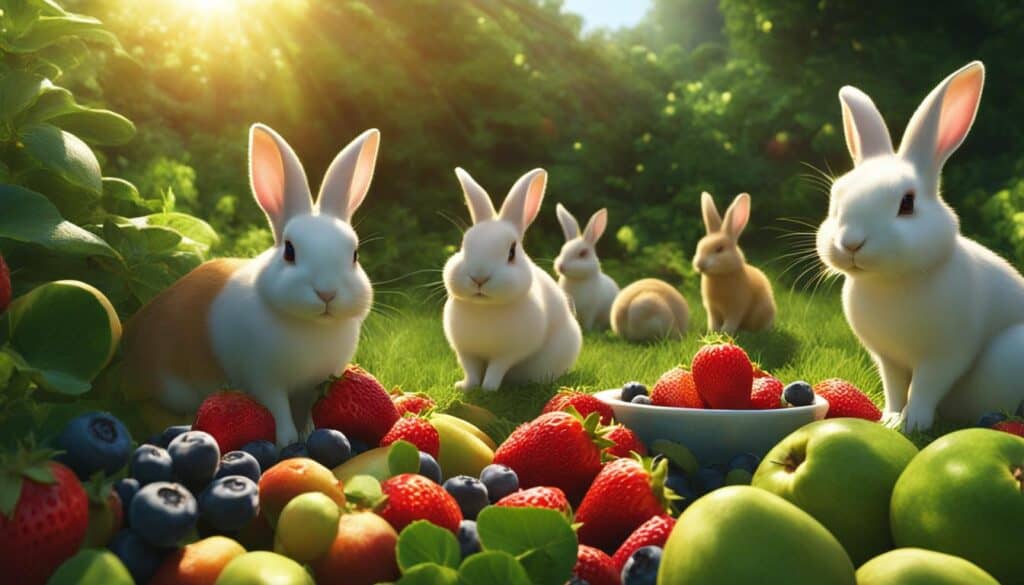
While there are many fruits and vegetables that rabbits can safely enjoy, there are some that should be limited or avoided in their diet. It’s important to be mindful of these restrictions to ensure the health and well-being of your furry friend.
Limiting High Sugar Fruits
Some fruits, such as bananas, should be given in small quantities due to their high sugar content. While these fruits can be a tasty treat for your rabbit, overfeeding can lead to weight gain and dental issues. As a general rule, it’s best to offer high sugar fruits sparingly and in moderation.
Moderate the Consumption of Certain Vegetables
While leafy greens like parsley and spinach are generally safe for rabbits, they contain oxalic acid, which can be harmful in large amounts. It’s important to offer a variety of greens to prevent excessive oxalic acid intake. Additionally, flowering vegetables like cauliflower and broccoli, as well as their stems and leaves, should also be given in small quantities to avoid digestive upset.
Avoiding Harmful Foods
There are several fruits and vegetables that should be completely avoided in a rabbit’s diet. Avocado, corn, legumes, iceberg lettuce, onions, potatoes, rhubarb, and wild-grown mushrooms can all be toxic to rabbits and cause various health issues. It’s crucial to steer clear of these foods to keep your rabbit safe and healthy.
| Fruits | Vegetables |
|---|---|
| Apples | Carrots |
| Bananas (in moderation) | Broccoli (stems and leaves in moderation) |
| Strawberries | Celery |
| Watermelon | Bell peppers |
Remember, when introducing new fruits and vegetables to your rabbit’s diet, it’s important to do so gradually and observe how they react. Offering a balanced and varied diet will ensure that your rabbit receives all the necessary nutrients while avoiding any potential risks or allergies.
How to Integrate Fruits and Vegetables into a Rabbit’s Diet
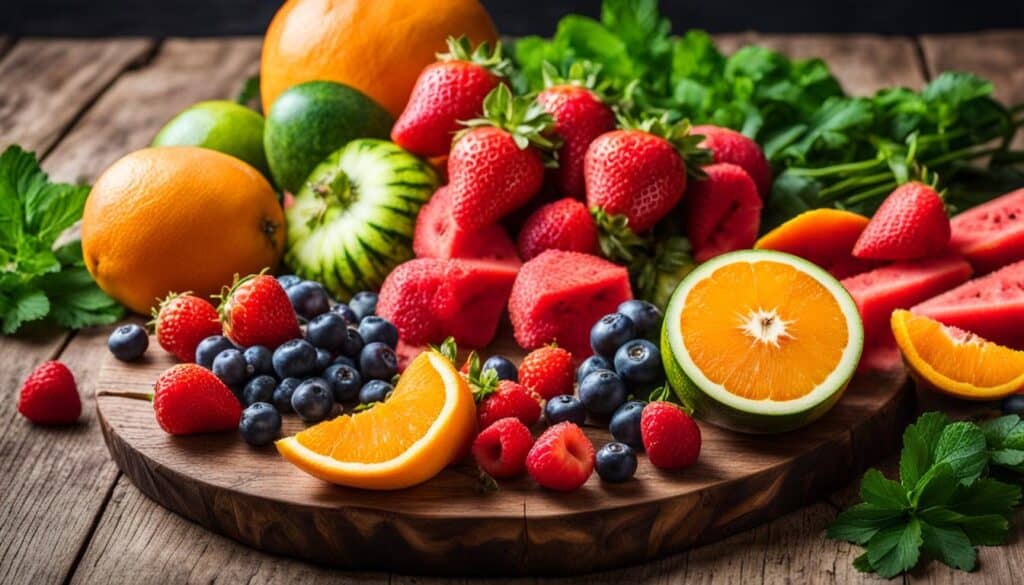
Introducing fruits and vegetables into your rabbit’s diet can offer nutritional variety and serve as a tasty treat. However, it’s important to do so gradually and in moderation to avoid any digestive issues. Here are some steps to follow when integrating fruits and vegetables into your rabbit’s diet:
Step 1: Start Slowly
Begin by introducing one type of leafy green vegetable at a time. This allows you to observe how your rabbit responds to each new addition. Start with small portions and gradually increase the amount over time.
Step 2: Serve Measured Amounts
It’s essential to serve fruits and vegetables based on your rabbit’s body weight. A general guideline is to offer about one cup of vegetables for every 2-3 pounds of body weight per day. Divide the portions into multiple feedings throughout the day to prevent overeating.
Step 3: Wash and Prepare
Always wash fruits and vegetables thoroughly before serving them to your rabbit. Remove any seeds, pits, or stems that could be harmful. Cut them into small, manageable pieces to avoid choking hazards.
Remember, while fruits and vegetables are a healthy addition to your rabbit’s diet, they should not make up more than 10% of their overall intake. The majority of their diet should consist of grass hay and leafy greens. By following these steps, you can ensure a well-rounded and balanced diet for your furry friend.
Helpful Feeding Tips for Rabbits
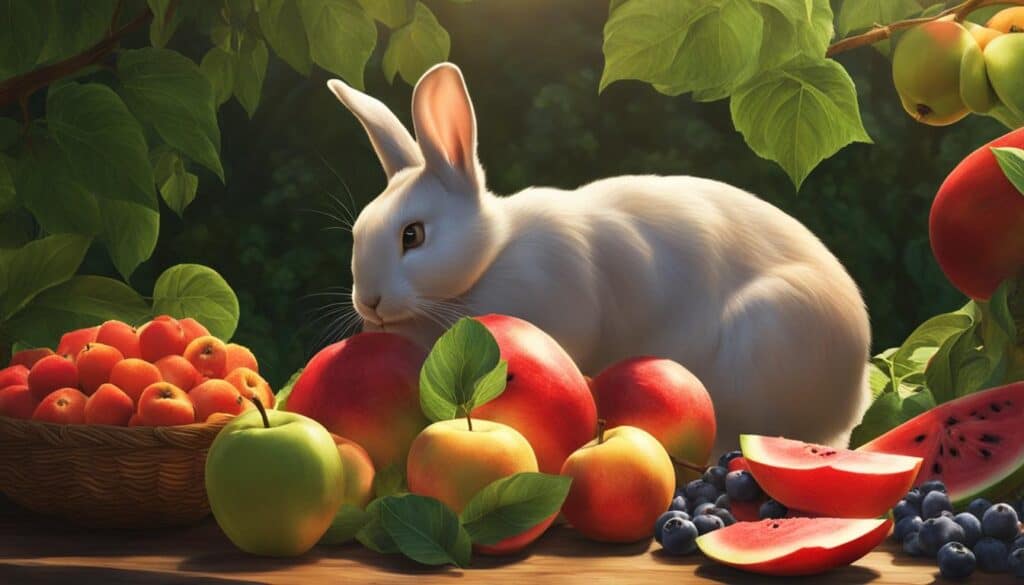
Feeding your pet rabbit a balanced and nutritious diet is essential for their overall health and well-being. Incorporating fruits and vegetables into their diet can provide added nutrition and variety. Here are some helpful tips to keep in mind when feeding fruits and vegetables to your rabbit:
Choose Organic Produce
When selecting fruits and vegetables for your rabbit, opt for organic produce whenever possible. Organic produce has less pesticide residue and higher nutrient density, which can be beneficial for your rabbit’s health. By choosing organic, you can minimize chemical exposure and provide your rabbit with the best quality food.
Rotate the Types of Greens
Offering a variety of greens is important to ensure a well-rounded diet for your rabbit. Rotate different types of leafy greens, such as parsley, spinach, mustard greens, and kale, to provide a range of nutrients. This not only keeps your rabbit interested in their food but also helps to avoid excessive intake of oxalic acid, which can be harmful in large amounts.
Provide Chewing Toys
Chewing is a natural behavior for rabbits and helps to keep their teeth healthy. Provide your rabbit with a variety of safe chewing toys, such as untreated wooden blocks or apple branches. These toys not only provide entertainment but also help to wear down their teeth, preventing dental problems.
Avoid Oats
While oats are commonly associated with rabbit food, they are actually a grain and not suitable for rabbits. Rabbits have a delicate digestive system that is not designed to process grains effectively. It’s best to avoid feeding oats to your rabbit to prevent any potential digestive issues.
Remember to always provide fresh water for your rabbit and consult with a veterinarian for specific dietary recommendations based on your rabbit’s individual needs. By following these feeding tips, you can ensure that your rabbit receives a healthy and balanced diet.
Organic vs. Conventional Produce for Rabbits
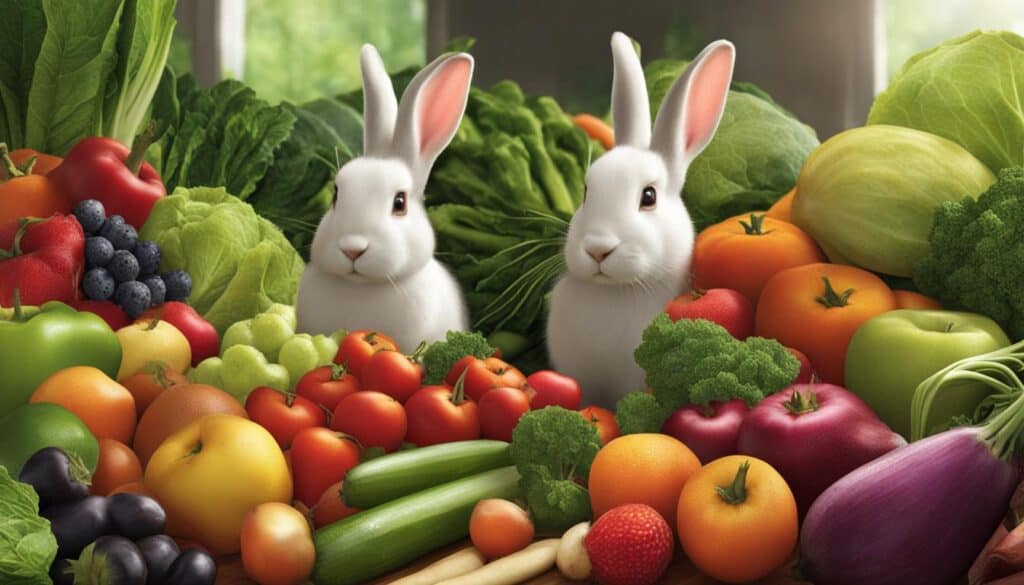
When it comes to choosing fruits and vegetables for your rabbits, you may be wondering if organic produce is necessary or if conventional options are just as safe. While both organic and conventional fruits and vegetables can be fed to rabbits, there are some important factors to consider.
Organic produce is grown without the use of synthetic pesticides, fertilizers, or genetically modified organisms (GMOs). This means that organic fruits and vegetables have less pesticide residue, which can be beneficial for your rabbit’s health. Additionally, organic produce is typically higher in nutrient density, providing your rabbit with more vitamins and minerals.
However, if organic produce is not available or is too expensive, you can still feed your rabbits conventional fruits and vegetables. Just make sure to wash them thoroughly to remove any pesticide residue. While conventional produce may have slightly higher levels of pesticide residue, research has shown that the levels are generally within acceptable limits and do not pose a significant risk to rabbits.
Ultimately, the most important thing is to provide your rabbits with a variety of safe and healthy fruits and vegetables. Whether you choose organic or conventional produce, always wash them before feeding and offer them in moderation as part of a balanced diet.
| Organic Produce | Conventional Produce |
|---|---|
| Less pesticide residue | May have slightly higher pesticide residue |
| Higher nutrient density | Similar nutrient content |
| Free from synthetic pesticides, fertilizers, and GMOs | Grown with the use of synthetic pesticides and fertilizers |
The Potential Risks of Certain Foods for Rabbits
While fruits and vegetables can be a healthy addition to a rabbit’s diet, it’s important to be aware of potential risks associated with certain foods. Here are some considerations to keep in mind when offering fruits and vegetables to your furry friend:
Risks of High Starch and Sugar Foods
Foods high in starch and sugar, such as grains and legumes, should be limited in a rabbit’s diet. These foods can contribute to obesity and digestive issues if consumed in large quantities. It’s best to prioritize leafy greens, hay, and rabbit pellets as the main components of your rabbit’s diet, with fruits and non-leafy vegetables offered in moderation.
Oxalic Acid Concerns
Some vegetables, such as parsley, spinach, and mustard greens, contain oxalic acid. While these greens can provide essential vitamins and minerals, excessive oxalic acid intake can be harmful to rabbits. It’s important to offer a variety of greens to ensure a balanced diet and avoid overloading on any one type of leafy green.
Safe Feeding Practices
When introducing new foods to your rabbit’s diet, it’s crucial to do so gradually to monitor their response. Always offer fresh, washed, and prepared fruits and vegetables to minimize the risk of contamination. Remember that each rabbit is unique, and it’s important to tailor their diet based on their individual needs and preferences.
| Foods to Limit | Foods to Avoid |
|---|---|
| Bananas | Avocado |
| Chard | Corn |
| Flowering vegetables like cauliflower and broccoli | Legumes |
| Broccoli stems and leaves | Iceberg lettuce |
| N/A | Onions |
| N/A | Potatoes |
| N/A | Rhubarb |
| N/A | Wild-grown mushrooms |
By being mindful of the potential risks associated with certain foods, you can ensure that your rabbit’s diet remains balanced and healthy. Remember to consult with a veterinarian for specific dietary recommendations based on your rabbit’s age, health condition, and individual needs.
Unsafe Fruits and Vegetables for Rabbits
While there are many fruits and vegetables that rabbits can safely enjoy, there are also several that should never be fed to them. These foods can be harmful and cause various health issues, so it’s important to avoid feeding them to your furry friend.
One fruit that should be completely avoided is avocado. Avocado contains a substance called persin, which is toxic to rabbits and can lead to digestive problems and even death. Corn and legumes, such as beans and peas, should also be avoided as they can be difficult for rabbits to digest and may cause bloating or gastrointestinal issues.
Iceberg lettuce is another food that should be off-limits for rabbits. It has little nutritional value and can cause digestive upset. Onions and potatoes are also unsafe for rabbits as they contain compounds that can be toxic to their system.
Other fruits and vegetables that should be avoided include rhubarb and wild-grown mushrooms. Rhubarb contains high levels of oxalic acid, which can interfere with calcium absorption and potentially cause kidney damage. Wild-grown mushrooms can be toxic and should never be fed to rabbits.
| Fruits to Avoid | Vegetables to Avoid |
|---|---|
| Avocado | Corn |
| Grapes | Legumes (beans, peas) |
| Raisins | Iceberg lettuce |
| Cherries (with pits) | Onions |
| Tomatoes (leaves and stems) | Potatoes |
| Rhubarb | Wild-grown mushrooms |
By avoiding these unsafe fruits and vegetables, you can ensure the health and well-being of your rabbits. Stick to the safe options and provide a balanced diet that includes plenty of grass hay, leafy greens, and a small portion of fruits as occasional treats.
Conclusion
In conclusion, it’s clear that rabbits can enjoy a variety of fruits as part of their diet. However, it’s important to remember that fruits should only make up a small portion of their overall food intake. Grass hay and leafy greens should be the main components, providing essential nutrients and promoting healthy digestion.
When introducing fruits to your rabbit, it’s crucial to do so slowly and monitor their response. Some safe options include apples, bananas, strawberries, watermelon, and papaya. These fruits can be offered as occasional treats, providing added nutrition and variety.
By maintaining a balanced diet and offering a variety of fruits and vegetables, you can ensure the health and well-being of your furry friend. Remember to provide fresh water at all times and choose organic produce whenever possible to minimize chemical exposure. With proper care and attention, your rabbit can enjoy a safe and delicious diet that includes a selection of rabbit-friendly fruits.
FAQ
Can rabbits eat any fruits?
Yes, rabbits can safely eat certain fruits, but they should only make up a small portion of their diet.
What should be the main components of a rabbit’s diet?
The majority of a rabbit’s diet should consist of grass hay, leafy green vegetables, and rabbit pellets.
How much fruit should rabbits eat?
Fruits should only be offered as occasional treats and should make up about 10% of a rabbit’s diet.
What are some safe fruits for rabbits?
Safe fruits for rabbits include apples, bananas, strawberries, watermelon, and papaya.
Are there any fruits and vegetables that rabbits should avoid?
Yes, rabbits should avoid certain fruits and vegetables, such as avocado, corn, legumes, iceberg lettuce, onions, potatoes, rhubarb, and wild-grown mushrooms.
How should I introduce fruits and vegetables to my rabbit’s diet?
It’s important to introduce new fruits and vegetables slowly and monitor your rabbit’s response. Start by offering one type of leafy green at a time.
Is organic produce better for rabbits?
While organic produce is recommended to minimize chemical exposure, conventional fruits and vegetables are still safe for rabbits after thorough washing.
What are the potential risks of certain foods for rabbits?
Foods high in starch and sugar, as well as vegetables containing excessive oxalic acid, should be fed to rabbits in moderation.
Can rabbits eat all types of fruit?
No, there are some fruits, such as grapes, cherries, and pits, that can be harmful to rabbits and should be avoided.
How should I provide fruits and vegetables to my rabbit?
Offer measured amounts of fruits and vegetables based on your rabbit’s body weight and divide them into multiple feedings throughout the day.
Do rabbits need access to fresh water?
Yes, rabbits should always have access to fresh water to ensure proper hydration.

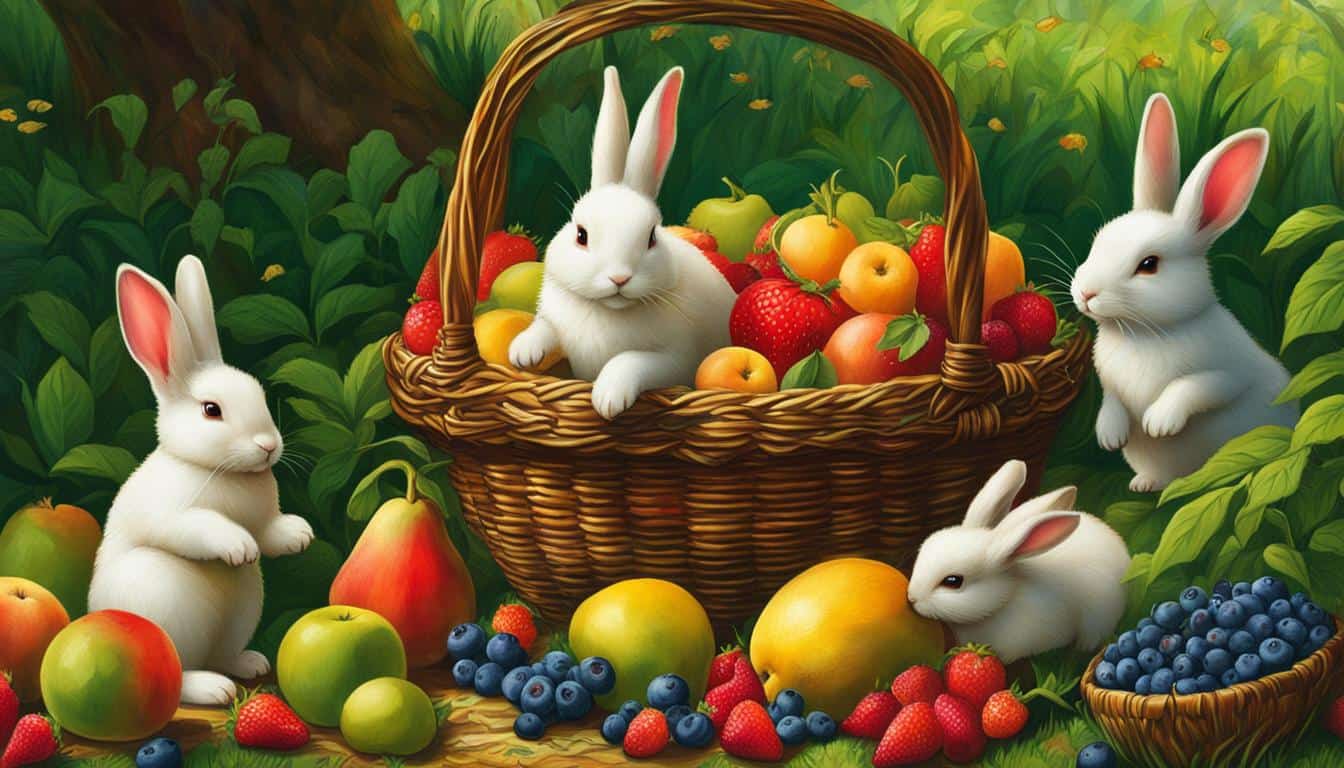



Leave a Reply